According to statistics, prostate inflammation occurs in 15% of the male population. This is a dangerous disease that, without treatment, causes the formation of cysts and stones in the prostate gland, erectile dysfunction (impotence) and infertility. You need to know the symptoms of prostatitis to see a urologist in a timely manner and cure the disease without consequences. Inflammation is divided into acute and chronic forms, each of which has special characteristics.
Common symptoms and signs of all types of prostatitis
Although prostatitis is acute and chronic, experts have identified several symptoms and signs of the disease that are common in men, which exist in both conditions: the first and the other.
Moderate pain in the perineum and scrotum
A painful and pulling sensation in the groin is the first sign of prostatitis in men. The symptoms are always worrying. The pain increases and decreases. One cannot show the localization of discomfort precisely, because the pain is often given in the lower back, sacral.
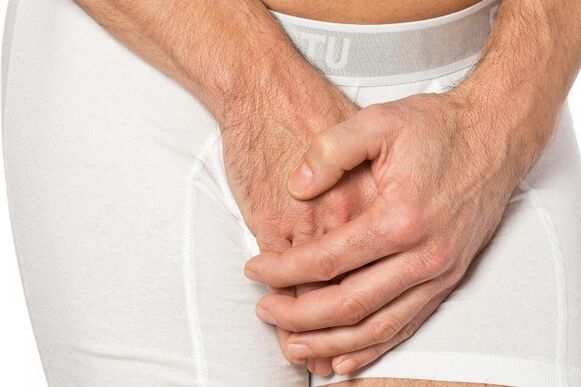
When symptoms appear, a man tries to sit or lie down, slightly bending over and pulling his knees to his stomach.
To treat discomfort, analgesics from the group of nonsteroidal anti-inflammatory drugs (NSAIDs) are used. Such drugs have a good analgesic effect and do not cause serious adverse reactions.
They are not recommended for men with gastritis or stomach ulcers.
Increased urination (pollakiuria)
With prostatitis, a man starts running to the toilet every 1. 5-2 hours. If you drink a few liters of beer or too much water in the heat, the situation becomes unbearable: the urge occurs every 20-30 minutes.
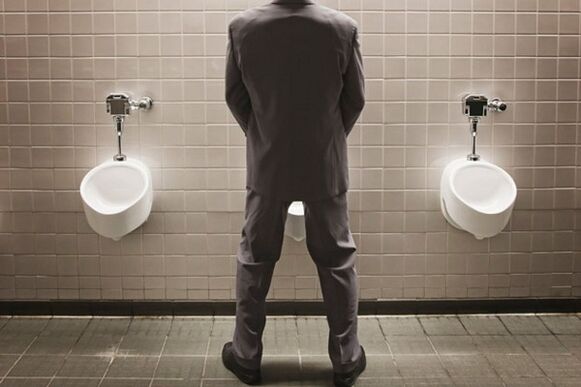
After going to the toilet, there is a feeling of not being able to urinate.
With pollakiuria, the pill will not help. The "drink less water" option also doesn’t work in this case. Cravings can occur even if there is a small amount of urine in the bladder.
Malaise
Weaknesses and weaknesses often occur early in the disease. Many don’t care too much about them, associating everything with too much work.
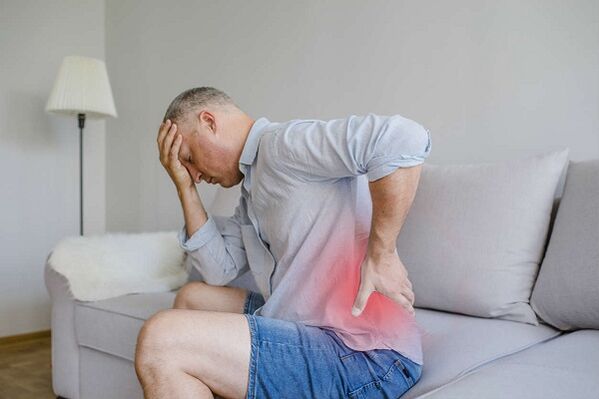
If a 40-year-old man suddenly experiences severe fatigue, inexplicable painful sensations in the muscles and joints, a decrease in interest in work, this may indicate the development of prostatitis. These symptoms alone do not make it possible to diagnose pathology, but when combined with 2-3 other symptoms, inflammation of the prostate is very possible.
To improve his well -being, a man needs more rest, to normalize his daily routine. A good night’s sleep that lasts for 7-8 hours is very important, and you should sleep no later than 11pm. Good effects are from vitamins both in natural form and in the form of supplements (use is recommended after consultation with a specialist).
Slow urine flow
Urination with too weak and short flow, spraying in all directions is a special complaint of men who face inflammation of the prostate gland. Seeing such a problem, one tries to strain and release a "strong flow", but nothing arises. For prostatitis, precisely slow flow is characteristic, not the discharge of urine in drops, which is more often observed with prostate adenoma in the middle and late stages of its development.
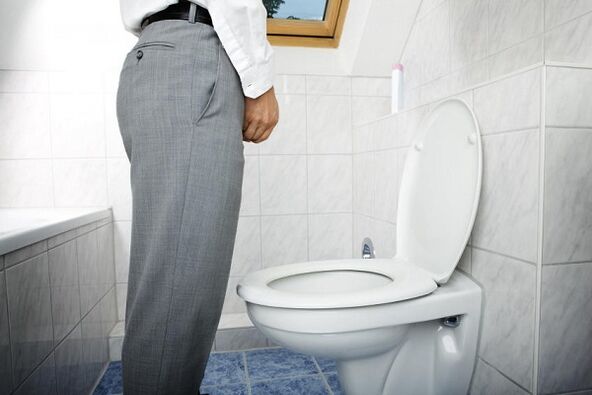
These symptoms are mainly related to swelling or dystrophic changes in the tissue of the prostate gland, which blocks the lumen of the urethra. NSAIDs that relieve swelling can relieve acute processes, but are ineffective in chronic inflammation. It is possible to get rid of edema at home with the help of prostate massage, but for this a man must have certain skills.
Mucus discharge from the urethra
Drops of secretion appear on the glans penis during the day. The discharge is caused by prostate self -massage, which occurs when walking fast, playing sports, running. As a result, part of the inflammatory secretion travels along the urethra and is released outwards. Often the mucus is cloudy, has an unpleasant odor, and sometimes the color is bad.
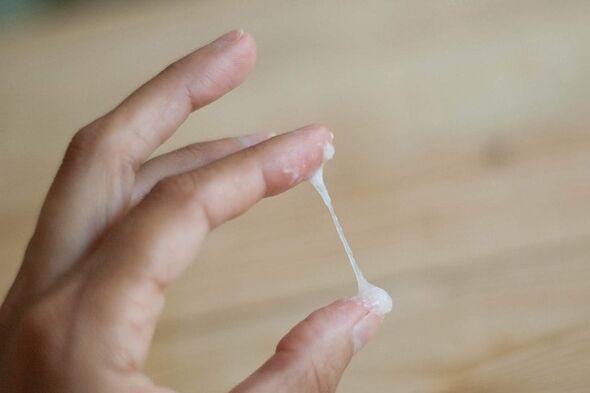
Men who face symptoms should adhere to strict hygiene. The genitals should be washed at least 2-3 times a day, because the secretions that accumulate in the head are an excellent medium for the reproduction of pathogenic bacteria. The genitals can be rinsed with antiseptic solution or decoction of chamomile, which helps destroy harmful microorganisms.
Pain when urinating
Symptoms of prostatitis are cramps and a burning (burning) sensation in the urethra that occurs during urination. The discomfort is more pronounced in the morning, as a large amount of inflammatory exudate accumulates in the prostate at night. The receipt worries a man not only while performing the stunt, but also within 15-20 minutes afterwards.
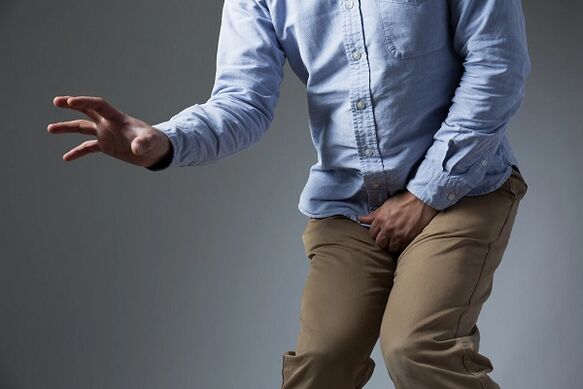
To reduce discomfort, you can use drugs from the group of herbal uroseptics. The drugs have antimicrobial and anti-inflammatory effects, they relieve symptoms and prevent inflammatory diseases of the urethra against the background of prostatitis.
Strong encouragement
Men describe this feeling as a sudden and painful urge to urinate. There is a fear of "not reaching out", because the sensation is painful and very strong.
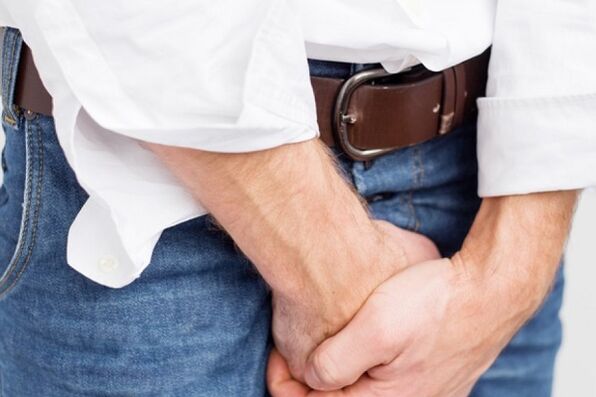
Often there is a wrong urge, when the flow of urine does not occur, and after a few minutes the pain subsides. Sometimes these symptoms are accompanied by urinary incontinence, when a few drops of fluid appear in the laundry.
The only doctor's advice in a situation like this is not to try to resist the urge. Frequent visits to the toilet cause psychological discomfort, but when efforts are made to force the muscles forcibly, the pain intensifies.
Acute prostatitis: what is painful at the same time and what disease sensation
Acute prostatitis in men has 9 special symptoms, which are mainly observed with acute manifestations of inflammation of the prostate gland. We will tell you in detail about each.
Extreme groin pain
Men complain of severe cramps, cramps and an unpleasant throbbing sensation in the groin area.
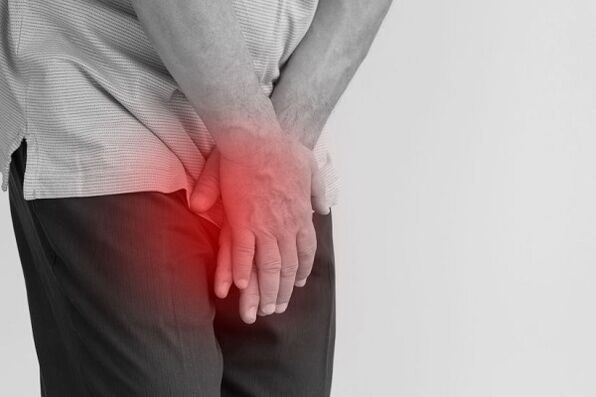
The pain worries a person constantly, increasing with prolonged sitting in a state of immobility, with urination. Sometimes the pain is so severe that it is impossible to walk normally.
These symptoms occur suddenly, they may be preceded by hypothermia or unprotected sexual intercourse.
Discomfort must be overcome. Painkillers are used to relieve the symptoms of prostatitis in men quickly. NSAIDs are the drugs of choice.
Haba
The active inflammatory process in the prostate gland is always accompanied by an increase in temperature. In acute prostatitis, the fever reaches a value of 39-39. 5 ° C. Body temperature rises suddenly, sometimes before the onset of pain or other special symptoms.
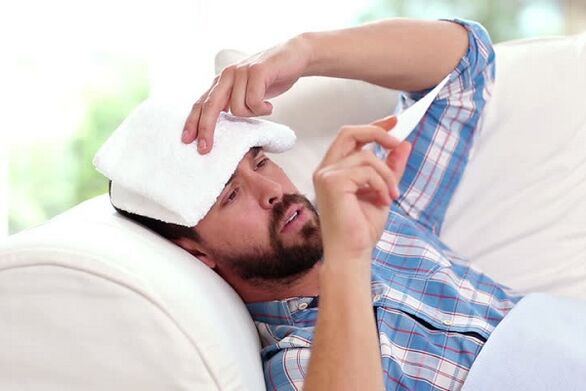
These symptoms may be accompanied by increased chills and sweating.
Temperatures above 38 ° C should be dropped. Standard antipyretic medication is sufficient. You should not use acetylsalicylic acid to lower the temperature. It has many proven side effects when used improperly, so you better use a safe product.
Cloudy urine
With prostatitis, inflammatory exudates are released from the glands, which appear during urination.
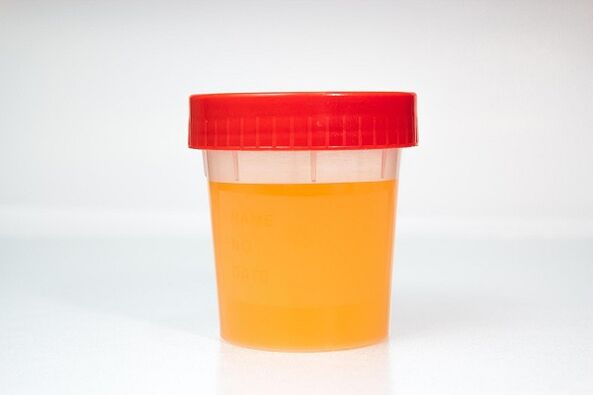
As a result, the urine becomes cloudy, sometimes an influx of individual mucus or pus can be seen in it. Inflammation of the prostate gland is characterized by changes in the last part of the urine, while at the beginning of urination, the flow has an appearance that is no longer unfamiliar. Turbidity is often accompanied by an unpleasant odor.
If such symptoms appear, it is advisable to use drugs from the uroseptic group. Here, not herbal remedies are more suitable, but drugs with antibacterial effect, which are more effective in this case.
Purulent discharge from the urethra
The appearance of a few drops of pus from the mouth of the urethra is a typical sign of bacterial prostatitis.
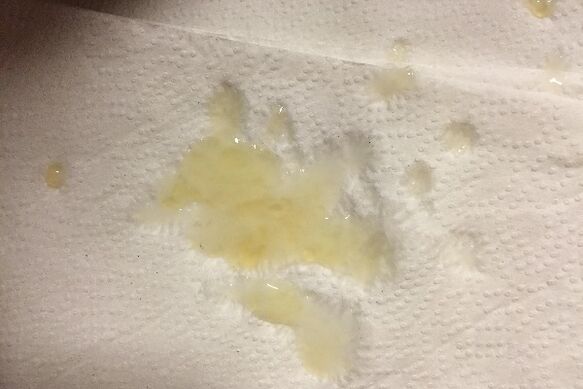
Symptoms can occur during the day, as well as at the end of each urination. If prostate disease is caused by trichomoniasis, gonorrhea, or another sexually transmitted infection, there may be a foul -smelling pus discharge.
Symptomatic treatment is carried out with uroseptic. Men are advised to maintain cleanliness and regularly wash the groin area with a solution of chamomile or antiseptic to avoid irritation and deterioration of the skin of the penis.
At the same time, it is important to start antibiotic therapy as soon as possible to prevent complications that arise, at first glance, harmless disposal.
Urinary retention
With acute edema of the prostate gland, urination is not possible, because the lumen of the initial urethra is completely blocked. The man felt the urge to go to the toilet, there was an exploding feeling in the suprapubic area.
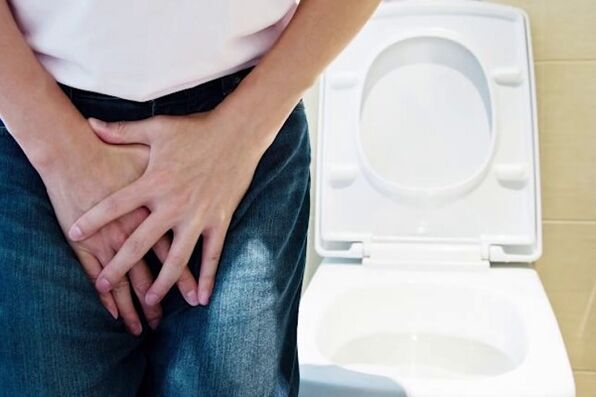
As you urinate, the pain gets stronger, but to no avail.
Herbal preparations, which contain, for example, sabal fruit extract, help fight urinary retention. They facilitate bladder emptying and relieve unusual suprapubic discomfort.
Headache
Symptoms of acute prostatitis include manifestations of intoxication. The inflammatory process in the prostate gland is accompanied by the production of certain biochemical markers that affect the overall state of the organism.
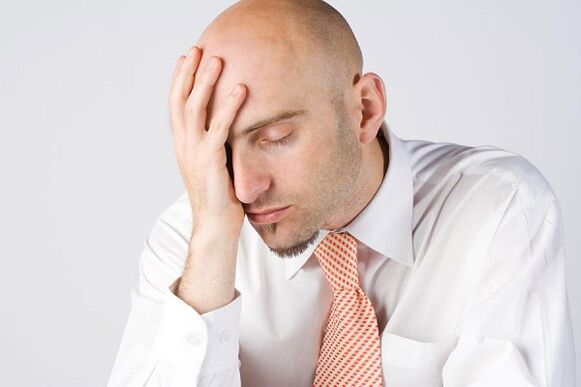
The disease is often accompanied by high fever, in which urgent or narrowing headaches also occur.
For pain relief, analgesics from the NSAID group are appropriate. If there is such discomfort, medication can be removed.
Painful bowel movements
When emptying the bowel, there is strong pressure on the inflamed gland, so that the man feels a sharp pain. Sometimes the pain becomes so strong that the person tries to hold back his desire so as not to feel uncomfortable.
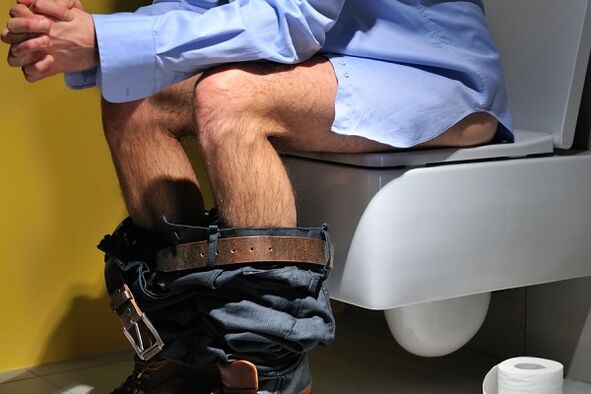
Sometimes, with prostatitis, tenesmus is observed - a painful "unsuccessful" urge to defecate.
Unpleasant sensations cannot be dealt with at home. The pain will disappear only after the acute inflammatory process subsides. Do not resist the urge to defecate, as constipation can occur, which will worsen the condition.
Lumbosacral pain
The unpleasant symptoms of prostatitis are caused by a general delay (supply of nerve endings) to the pelvic organs, which causes the pain to spread to nearby parts of the body.
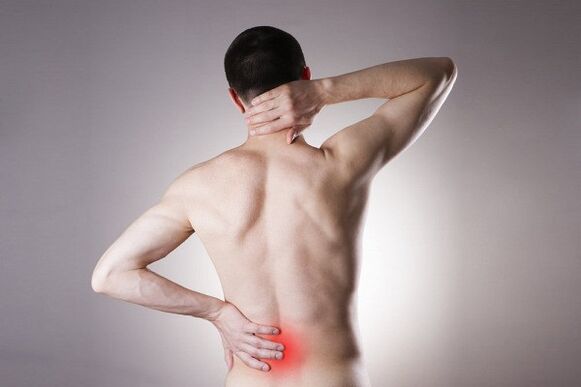
The pain can be dull and aching or sharp. Its special feature is a sharp "lumbago" in the lumbar region, which occurs when straining, defecating, urinating.
To relieve the symptoms, painkillers from the NSAID section are appropriate. You should not use a warm water bath or warm the lumbar zone to relieve discomfort, as this can accelerate the process of acute and purulent inflammation, accelerating its development.
Body ache
These symptoms develop as one of the components of the intoxication syndrome in prostatitis. The man complained of discomfort in the joints and muscles: apparently they were simultaneously twisted, stretched and squeezed.
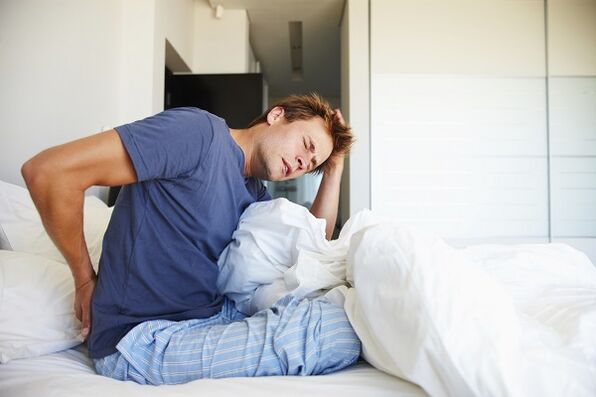
This nausea is similar to the onset of a cold or flu.
There are no medicines or folk remedies to relieve discomfort. These symptoms mainly occur on the background of fever, therefore, after lowering the temperature (in a simple way), the pain in the body disappears, and the state of health improves.
Diagnose chronic prostatitis at home with signs and symptoms
Chronic prostatitis is distinguished by a number of signs, so it can be diagnosed at home, even before going to a urologist.
Painful ejaculation
Unpleasant sensations bother a man when approaching orgasm: the pain begins in the scrotum and perineum, which is given to the penis. The discomfort reaches its maximum intensity during ejaculation, when a person may experience sharp spastic pain.
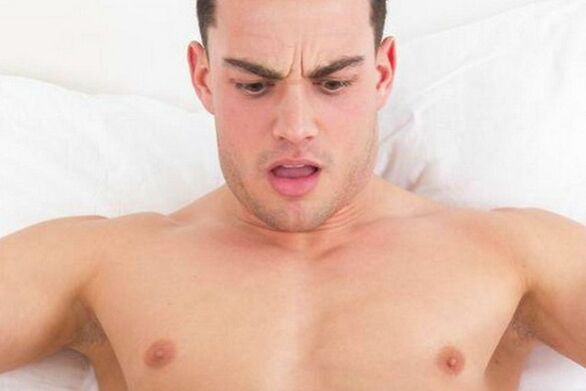
This situation is repeated with each intercourse, but the strength of the painful sensation varies.
To reduce discomfort, urologists recommend a man have sex regularly (at least 2 times a week). This helps relieve congestion in the prostate gland. After ejaculation, a warm sitz bath helps relieve pain.
Frequent night trips to the toilet
Symptoms of chronic prostatitis include nocturia - frequent, infrequent urination at night. The patient must get up 2-3 times or more to go to the toilet.
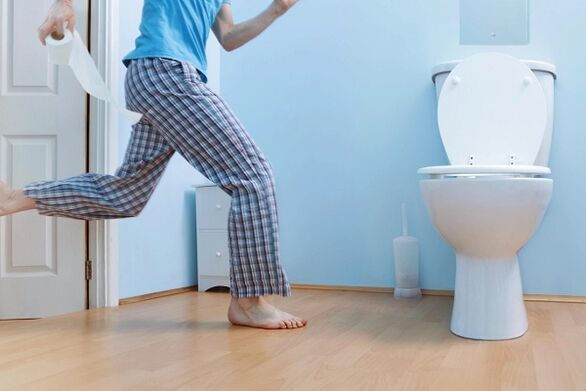
The urge to urinate is quite painful, and urination is accompanied by discomfort in the perineum and in the lower abdomen. Symptoms can occur regardless of the amount of fluid consumed at night.
There is no symptomatic treatment. To reduce the frequency of waking up at night, you need to limit drinking water and drinks in the evening, try to empty the bladder completely before bed.
Constipation
The prostate gland grows large and presses on the rectum, so the act of defecating is difficult to perform. Men complain of persistent constipation for 3-4 days or more. When you try to strain, pain occurs in the perineum, sacral area. Symptoms bother a person for weeks or even months.
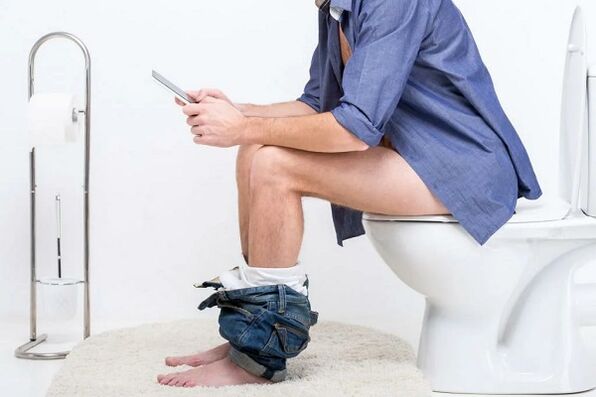
To increase bowel movements, doctors recommend eating more vegetables and fruits, whole grain cereals. These foods are rich in fiber, which increases the amount of stool and makes it softer. Prunes, fresh plums, kefir and other fermented milk products have a natural laxative effect. For prolonged constipation, you can use laxative tablets or suppositories.
Subfebrile temperature
Increased thermometer reading to 37-37. 5 ° C occurs with an increase in chronic prostatitis. In this case, headache, malaise, body aches and special symptoms of the disease are combined.
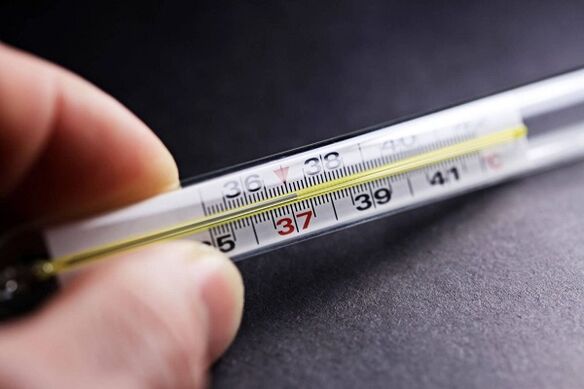
The use of antipyretics is not suitable for indications up to 38 degrees on a medical thermometer. Recurrence treatment should be carried out, because in fact, the emergence of subfebrile conditions.
Weakens erections
With chronic prostatitis, sexual problems can occur not only in old age, but also in young men after 30 years.
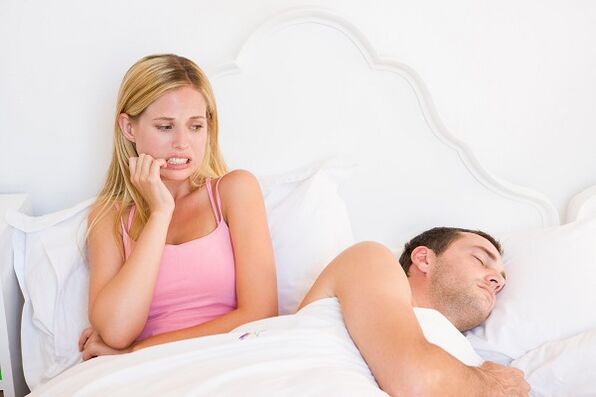
Patients complain that during erectile stimulation is not firm enough. This causes psychological and physical discomfort. For fear of "failing", the man avoided sexual intercourse, which exacerbated the problem.
There are many folk remedies from treating potential problems. Just a few of them: decoctions of thyme and rose hips, tincture of rowan berries, the use of propolis. A man is advised to consume more celery, which has a good effect on erections, and drink ginger tea.
Decreased performance
With chronic prostatitis, a man experiences weakness, fatigue, irritability and constant nervousness.
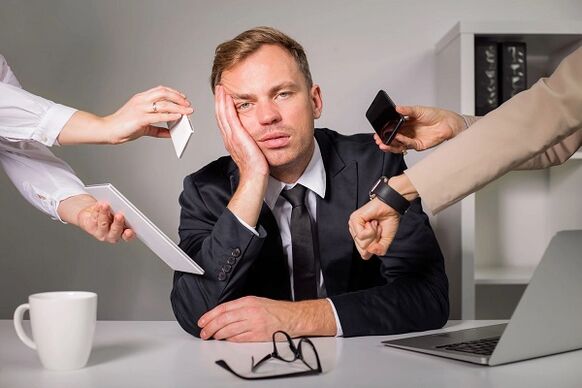
Concentration and memory will definitely decrease, and it becomes more difficult to perform normal work tasks. These symptoms also apply to physical labor: even with minor exercise or sports training, muscle pain and severe fatigue occur.
During such a period, it is important to take care of yourself, rest a lot and do not try to complete all tasks to the maximum of your ability. After treatment of prostatitis (or at least achieving a stable deterioration), the unpleasant symptoms will disappear, then the possibility will continue to run.
Inability to conceive a child
With the onset of asymptomatic chronic prostatitis, men often go to the doctor with complaints that they are unable to conceive a child.
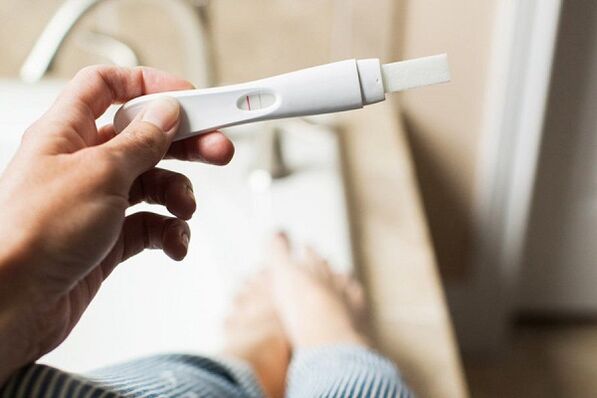
Patients say that they do not experience pain and urinate frequently, and even during sex, everything can be normal. This option for the development of pathology is considered unfavorable, as this means that a man is already suffering from a more advanced disease.
Viable and active sperm production is a serious process regulated by the sex glands and brain. There are no folk recipes and symptomatic medications that will help in this case, it is important to study and solve the problem at the medical level.
Comments: men's opinions on the forum
- "I got signs of prostatitis more than a year ago. At first, there was a bit of pulling on the groin and perineum, then the pain got stronger. I noticed that I woke up 2-3 times at night to go to the toilet. I didn'ttoo concerned. I think I was frozen somewhere or sitting in a draft. Then the problems in sex started: unstable erections, decreased sensitivity, no obvious sensation during orgasm. At work, a colleague advised me to be a podmore bee. I took it for a few months (in the form of tingtur, bought it from a local beekeeper), the condition improved, the pain disappeared. "
- "I have pain in the scrotum, perineum, and lower abdomen pulling. Sometimes a few drops of pus come out of the urethra. I read reviews on the Internet, where men describe similar symptoms, go to the doctor and they are diagnosed with prostatitis. I know thatthe disease was serious, so I decided not to delay treatment. Hospitals did a lot of tests and ultrasounds, prescribed pills. Prostatitis was cured, but problems with the intestines started, probably due to antibiotics. Then for 2 months I had to buy probiotics, then kefir and yogurtassorted to relieve stomach discomfort ".
- "For a long time I thought that I had digestive problems. I also didn't know about prostatitis - I didn't know that my lower stomach was sore and the stools were disturbed. I actually had these symptoms. I even started visiting the toilet a little bit, but at first I didn'tpay attention to this sign. Good because I decided to go to a urologist. I was diagnosed with chronic prostatitis. I was treated for a long time, took different pills, put out candles. Honestly, I don't even remember his name, somehow it crossed my head"Now I'm having fun. "
- "I knew firsthand what prostatitis was. It all started suddenly for me: there was severe pain in the scrotal and suprapubic zones, the urge to defecate literally every 30 minutes. For a few days I suffered so much and went tourologists. They did urinalysis and ultrasound of the prostate, did a smear, and the doctor wanted to see what was there rectally with a finger, but I refused, in general . . . It turned out that "acute prostatitis" had developed. The doctor prescribed antibiotics. After 2weeks I'm completely cured, so far no relapse, I hope it won't happen again, this is scary, because they say that prostatitis can't be cured. "
discovery
With any form of prostatitis, the use of symptomatic therapy alone is not effective enough. NSAIDs or analgesics will temporarily relieve pain and fever, and uroseptics will help reduce microbial inflammation. But at the same time, pathological processes in the prostate gland continue to develop, becoming a chronic form. As a result, echographic changes (tissue sclerosis), erectile dysfunction appear, and the risk of prostate cancer increases.
In order for the disease not to bring tragic consequences, complex prostatitis treatment is required. The therapeutic regimen is prescribed by a doctor (urologist, more rarely - an andrologist), taking into account the characteristics of the disease and the results of its tests.



























